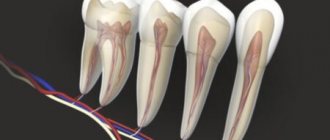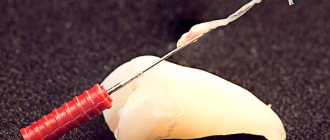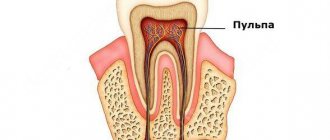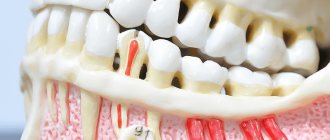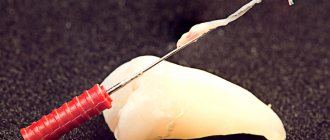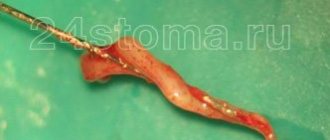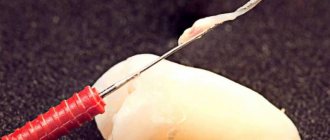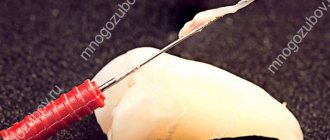Tooth nerve and need for removal
A tooth is not just a bone. In its roots there is a living pulp - blood vessels with nerve endings. This pulp is called the dental nerve; with its help, the tooth senses heat or cold. If the pulp is removed, the tooth dies, is not supplied with blood, is easily destroyed, and is less resistant to influence.
If a tooth is affected by caries, at first the destruction involves only dentin, the durable tissue of the tooth. But if caries is not treated in a timely manner, it will reach the pulp and pulpitis will begin. Then the pulp has to be removed - completely or partially, and if the pulpitis has reached periodontitis, the pulp has to be completely amputated. The nerve is also removed in case of mechanical destruction or prolonged pain.
Methods for removing a nerve in a tooth without pain
Often a visit to the dentist is postponed until a person begins to suffer from acute toothache and removal of the dental nerve is no longer possible. The procedure for removing the nerve of a tooth today has become less painful and scary, but the sooner the patient contacts a doctor at a dental clinic, the more effective the dental treatment will be. Modern treatment methods require comfortable conditions during nerve removal and a painless process.
Reasons for removal
The dental pulp is a bunch of nerve endings and blood vessels, which is called the nerve of the tooth. It reacts to all changes that occur to the tooth. At the beginning of dental disease, the top layer is affected - enamel, then dentin and pulp. If the infection spreads to soft tissues due to untimely treatment, then the nerve is removed. This condition is accompanied by toothache, which becomes especially severe at night. A tooth with complete pulp damage is not supplied with blood and nutrients. If you do not visit a doctor at the Sanation dental clinic at the first signs of inflammation of the teeth or pain, the pathological process will develop, and the nerve will have to be removed.
Signs of pulp inflammation are:
- Severe toothache, growing gradually and without any reason. If the pain increases when you tilt your head, it is quite possible that this is a sign of an inflammatory process. If this pain intensifies at night, then going to the doctor cannot be postponed. - Pain caused by an irritant, such as hot or cold food. A sign of pulp damage is pain that does not go away immediately after removal of the irritant.
Modern methods
Today, dentistry offers many methods of dental treatment and nerve removal if this cannot be avoided. If the pulp has become inflamed recently and the acute pain lasts no more than two days, then there is a chance to save the nerve of the tooth. Previously, there was one proven method of removal using arsenic. With the advent of new approaches to dental treatment, this method is being challenged and used less and less. Its essence lies in the fact that arsenic was placed on the affected pulp, which is a toxic substance, but in therapeutic doses does not harm humans.
To begin with, the dentist cleans the tooth cavity with a drill to put the required amount of arsenic there, then places a temporary filling. It takes from two hours to several days for the nerve to die. After the second visit to the doctor, the filling is removed, the tooth cavity is cleaned and a crown or filling is placed. Arsenic is safe for human health, but it affects tooth tissue, so now they resort to removing a nerve using this substance less and less often.
New methods of nerve removal offer the patient a quick and effective solution to the problem. Using special equipment, the nerve is removed in half an hour. The doctor applies local anesthesia so that the patient does not feel pain. The dentist puts a temporary filling on the patient and sends him for an x-ray. Now, with the availability of new equipment in the clinic, it can be done without even leaving the office. If the results of the image are positive, then the doctor fills all the canals of the tooth. To undergo such a simple and effective procedure, you need to contact a doctor at the Sanation clinic at the beginning of the disease, because in advanced cases it is difficult to do without the use of arsenic.
With the help of modern technologies in dentistry, it is possible to remove the pulp painlessly. But it is no longer possible to save it in case of damage. Without pulp, the tooth is no longer supplied with necessary substances and dies, and the enamel becomes thin and vulnerable. The dentist can severely destroy the tooth during the procedure because it is difficult to reach the nerve.
Still, the best way to preserve an operated tooth is to install a metal-ceramic crown, which will protect the tooth better than any filling. Provided timely surgery to remove the nerve and high-quality installation of fillings or crowns, the tooth can serve a person for about ten years. If it is possible to preserve the pulp of a tooth, then you should definitely take advantage of it, because a tooth without a nerve is a dead tooth. The best way to solve this problem is preventive examinations with a doctor at the Sanation dental clinic and timely dental treatment.
Helpful information
Tooth extraction
Removal with arsenic
Once upon a time there was only one way to remove it, it was terribly painful, especially since you had to visit the doctor several times. At first, the doctor drilled the tooth down to the pulp with a drill, which was extremely painful. Next, arsenic was placed in the hole and it was temporarily sealed with a filling. In a couple of days, the arsenic dealt with the nerve, and the tooth hurt so much that no medicine could help. Then I had to go to the doctor again, he opened the temporary filling, removed the nerve, and cleaned the root canals. Pulp is a tenacious substance, so this process was also extremely painful.
This technology poses a certain danger, because arsenic is a poison, and the doctor, when using it, must be especially careful, and the patient must be careful: if you are late with the second visit to the doctor and leave arsenic in the tooth, it will completely destroy it, which will end deletion. Dentists stopped using arsenic and developed new techniques for removing pulp.
Is it possible to kill a nerve yourself?
Many people try to remove the nerve endings in the tooth on their own. When a pathological process develops, the help of a specialist is required, otherwise complications may occur. There are various techniques that show how to kill the nerve of a tooth at home. All of them are for informational purposes only. Vinegar can be used for killing; a piece of cotton wool is treated with vinegar essence and applied to the tooth. It is important to note that the essence can completely destroy enamel and dentin and lead to irreversible consequences.
We looked at what would happen if you removed the nerve in a tooth yourself. This can lead to complete destruction of an element of the dentition. The patient will lose a tooth and may subsequently require the installation of an implant, crown, or other suitable orthodontic structure.
Modern pulp removal
Today, it is enough to go to the dentist once to remove the pulp. The doctor gives an anesthetic injection and calmly works with the tooth, removing the destroyed layer of dentin, extracting the pulp, treating and filling the canal. Sometimes inspection using a microscope is possible. To be on the safe side, your doctor may place a filling temporarily to make sure he has completely removed the pulp. And only if everything turns out to be in order, the final filling is installed.
Incomplete removal of the pulp is also possible, which makes sense if only the outer part of the pulp is affected by inflammation. Dead tissue is removed from the opened tooth, the outermost part of the pulp is removed, and the root remains intact. This is especially important on children's teeth, since the pulp is responsible for the formation of roots. When the pulp is not completely removed, the tooth is kept alive, and further destruction occurs more slowly.
How to remove the nerve of a tooth today
Today it has become possible to remove the dental nerve by visiting the dentist just once. Depending on the diagnosis, the nerve is removed completely or partially.
- Complete removal. It is performed under anesthesia. After an anesthetic injection, the doctor removes the affected dental tissue and extracts the pulp with a special tool. The procedure lasts on average half an hour. If the depulpation process was controlled using a microscope, the dental canals and the tooth itself are thoroughly filled after the procedure. Sometimes the dentist first places a temporary filling, and then, after making sure that the procedure was completed successfully, changes it to a permanent one.
- Partial removal. It is carried out when only the coronal part of the pulp is affected. The root is preserved, and the inflamed tissue is removed. If the nerve is partially amputated, tooth decay does not occur as quickly. Therefore, this method is recommended for carious disease of molars in children.
Why does a tooth from which the nerve has been removed hurt?
Patients often complain that the tooth from which the nerve was removed continues to hurt. This is a completely natural pain, the result of intervention in the body. In a couple of days the pain will go away. It can be observed when clenching teeth, when reacting to hot and cold. To reduce discomfort, take analgesic medications.
But if, due to improper treatment, the nerve was not completely removed, the pain and inflammation will return. It is possible that the canals were poorly treated, and there may also be an allergy to the filling material. It is necessary to go to the doctor immediately, since advanced inflammation can lead to tooth loss.
The tooth from which the nerve has been removed becomes dead, but it still remains and is not lost, so if you have a toothache, immediately go to the dentist. There is nothing to be afraid of - modern treatment is painless, and after it your diseased tooth will serve you for many years to come.
How to kill the pulp in dentistry
A dental procedure is performed under anesthesia, regardless of the nature and scope of the work. The specialist knows why there are nerves in teeth, so he selects an anesthetic taking into account the anatomical features, the patient’s possible allergic reaction and individual wishes. The depulpation process is as follows:
- Removal of dentin and enamel with anesthesia. The procedure is carried out using air cooling technology.
- Placing a special paste that allows you to kill the nerve of the tooth, both the canine and the molar. Today, modern pastes are used to devitalize nerve endings.
- Installation of a temporary filling.
- Removal of temporary filling, opening of the pulp chamber, extraction of nerve endings.
- Canal cleaning, disinfection, filling.
At the final stage, a control x-ray is taken, where the patient and the doctor can see how the canals were sealed. After the procedure, the question may arise about how to relieve toothache even though the nerve has already been removed. For this you can use drugs such as Ibuprofen, Pentalgin, Nimesil. It is recommended to use only those products prescribed by the dentist. After treatment for pulpitis, pain may be observed for a week.
Why does a tooth hurt?
There are no unpleasant sensations during the procedure itself, but there are exceptions. In the case when treatment is carried out without anesthesia, the dental nerve hurts greatly. In dentistry, of course, not pure arsenic is used; the nerve is killed with a multicomponent paste. After the medicine is administered, the organ should not hurt much, since the paste contains an anesthetic substance.
In addition to arsenic, medications contain:
- antiseptic to neutralize pathogenic microflora and disinfect necrosis;
- anesthetic to relieve pain during nerve necrosis;
- an astringent to prolong the action of the paste and slow down the penetration of arsenic into soft tissues.
Representatives of such pastes with arsenic anhydride are Septodent, Kaustinerv, Pulparsen.
How long can you walk with an exposed pulp, and for how long do you put arsenic in your tooth?
To reach the pulp zone you need to get close to it. This happens most often when patients come with complaints of severe pain. They are like a sharp piercing electric shock. The response time is very difficult to bear.
Patience does not respond well in this case.
Introduction of a composition into the prepared cavity of the chewing element to block the functioning of the pulp
When we come to see the dentist, pulpitis is already activated. Then you have to use a long-acting drug. The period of the necrotic process or after what time arsenic kills the nerve lasts at least two days. But it takes three days to completely kill living tissue. This is not only the optimal period for the composition to act on the tissue inside the canals, but during this period it will not have a strong toxic effect on the tissue of the mineral formation.
What is pulp?
The pulp, or dental nerve, is a bundle of nerve endings and capillaries in the internal cavity of the tooth. It is protected from external irritants and infection by the tissue that is located in the root and crown.
After removal of the nerve, the blood supply and mineralization of the tooth deteriorate significantly. In addition, its sensitivity decreases, the enamel becomes dull and weakens. In other words, pulp removal negatively affects the structure and strength of the tooth, but makes it possible to preserve it.
Indications for the procedure:
- exposure of the nerve as a result of tooth trauma and damage to the crown;
- consequences of improper dental treatment;
- the presence of caries-affected tissues;
- preparation for prosthetics;
- chronic inflammation of the pulp (pulpitis);
- inflammation of the root membrane of the tooth (periodontitis);
- low placement of crowns;
- extensive pulp area;
- bactericidal infection of the apex of the tooth root.
